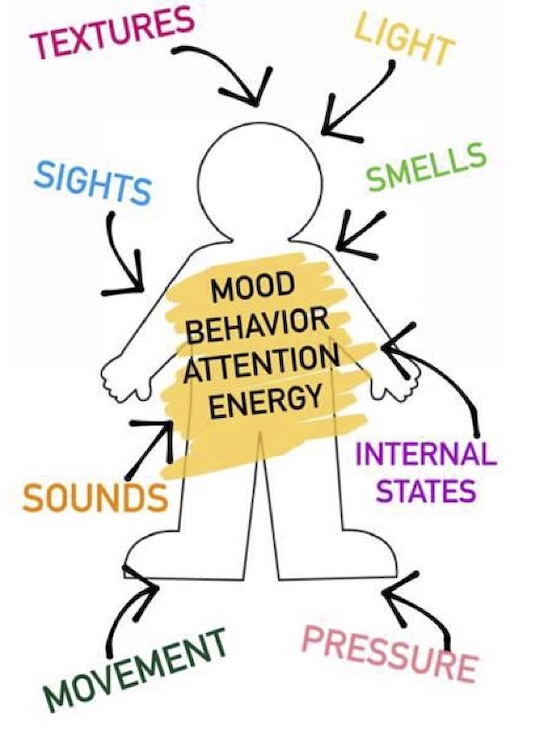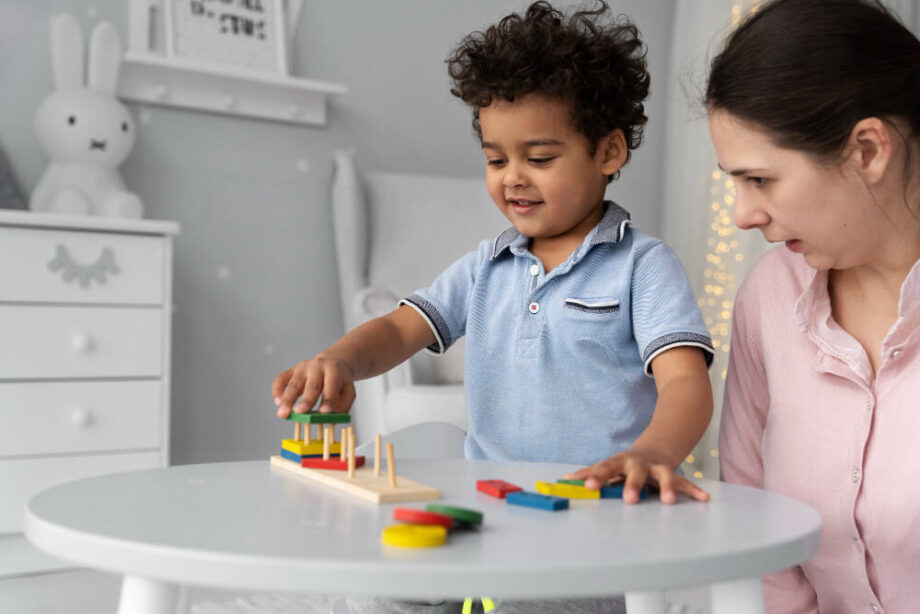Have you ever seen your child covering their ears in an environment that isn’t particularly loud? Or spitting out food that doesn’t feel right on their tongue? Your child could be experiencing challenges with sensory processing.
What Is Sensory Processing?
Sensory processing allows us to organize and understand information from our body and environment, helping us interact physically and socially. For example, imagine a child attending a birthday party with balloons, music, and games. Different sensory systems help the child navigate this environment:
- Auditory processing allows them to handle the noise of children screaming and running around and focus on instructions from their parents.
- Visual processing helps them appreciate the colorful balloons without becoming overwhelmed.
- Tactile processing enables them to tolerate touching cake frosting, confetti, or friends’ clothes.
- Olfactory processing helps them manage different fragrances, like candles and flowers.
- Gustatory processing allows them to taste foods of varying flavors and textures — sweet, salty, spicy, solid, semi-solid, or pureed.
- Vestibular processing (balance/movement) allows them to enjoy swinging, bouncing on a bouncy castle, or spinning in games.
- Proprioceptive processing (body awareness/pressure) enables them to carry a plate, hug friends, or jump on a trampoline comfortably.

What Is Sensory Processing Disorder (SPD)?
Sensory Processing Disorder is when a child has difficulty receiving, organizing, processing, or responding to sensory information from their environment or body. Some children may seek sensory input, while others may avoid it.
Who Can Have Sensory Processing Disorder?
SPD can occur in any population. It is more commonly seen in children with:
- Autism Spectrum Disorder
- Attention Deficit Hyperactivity Disorder (ADHD)
- Developmental delays
- Learning disorders
Recent research also suggests that typically developing children may experience sensory processing challenges.
Can Children with SPD Have Speech Issues?
Yes. Sensory processing difficulties can impact speech and language development.
- A child with auditory processing challenges may struggle to follow instructions because they are distracted by environmental sounds.
- A child with visual processing difficulties may have trouble understanding picture books or interpreting facial expressions and gestures.
- Tactile processing issues can affect the oral sensory system, making it difficult for the child to use certain speech sounds or move their tongue and lips effectively.
- Proprioceptive or vestibular issues may affect posture, which in turn impacts breath support — the “power generator” for speech. This can make the child sound breathless or speak in short phrases.
- Gustatory and olfactory processing difficulties may result in picky eating, limiting oral experiences and indirectly affecting speech and feeding.
It may seem overwhelming, but the good news is that therapy can help!
How Can a Speech Therapist Help a Child with SPD?
A speech therapist identifies the sensory challenges that interfere with a child’s speech and language development.
- For children with speech clarity issues, the therapist works on improving oral awareness through activities such as blowing bubbles or using straws.
- They guide the child on correct tongue and lip placement to produce specific speech sounds.
- They collaborate with occupational therapists to design activities that improve focus, attention, imitation, and play skills.
- For children with oral sensory or motor difficulties that interfere with feeding (e.g., reduced chewing, spitting out foods, avoiding new textures), the therapist gradually encourages exploration of foods, helping the child feel safe and comfortable.
- Oral exercises are used to strengthen the oral structures and improve coordination for chewing and speech.
Every child’s sensory profile is unique, and challenges with sensory processing can impact speech, language, and daily life. With the right support, children can gradually learn to manage sensory input and improve communication skills.
Speech and Occupational therapists predominantly deal with sensory challenges that a child exhibits. Speech therapy, often in collaboration with occupational therapy, provides targeted strategies to strengthen oral awareness, feeding skills and attention.
Identifying these challenges at an early age and consistent practice at home can make a meaningful difference in a child’s confidence and ability to engage with their environment. With patience and guidance, children with Sensory processing disorder can thrive both socially and academically.
Does your child show symptoms of Sensory Processing Disorder?
At Power Learning, we understand that supporting a child with Sensory Processing Disorder (SPD) requires more than just speech therapy; it takes a team. That’s why we offer a multidisciplinary approach, bringing together experienced speech-language pathologists, occupational therapists, special educators, and other professionals who collaborate to create personalized, holistic treatment plans.
Book your free appointment to know more. Our goal is to support not just speech, but your child’s overall communication, confidence, and learning. We combine evidence-based techniques with a child-friendly, play-based environment, making therapy both effective and enjoyable.

